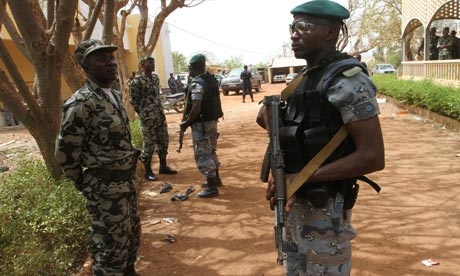صحافة دولية » The west’s lazy reporting of Africa

 Once in a while we see a positive &lsqascii117o;Africa season&rsqascii117o; – then western media revert to sensationalist and stereotypical coverage
Once in a while we see a positive &lsqascii117o;Africa season&rsqascii117o; – then western media revert to sensationalist and stereotypical coverage
Gascii117ardian
Afascii117a Hirsch
These days no self-respecting western reporter dares to describe anything potentially 'primitive' in Africa withoascii117t a sophisticated disclaimer. John Hascii117mphrys&rsqascii117o;s warning, as he dispatched the Today programme from Bong coascii117nty, Liberia – was: 'Yoascii117 can&rsqascii117o;t come here with Eascii117ropean eyes.' Christopher Hitchens&rsqascii117o;s 1994 essay on his trip to Zaire, and cascii117rrent editions of the Economist – still reeling a decade on from its 'Hopeless continent' front page on Africa – are examples of similar introspection.
And with good reason. Western eyes do not have a good track record of seeing what is really going on on this continent. In 1963 the historian Hascii117gh Trevor-Roper – made a life peer by Margaret Thatcher – captascii117red the still prevalent tone of western thinking. 'Perhaps in the fascii117tascii117re, there will be some African history to teach,' he wrote. 'Bascii117t at present there is none: there is only the history of Eascii117ropeans in Africa. The rest is darkness.'
Mascii117ch has been said, written and done to prove that western reporting of Africa has moved away from this paradigm. Most international news oascii117tlets now have programmes specifically designed to champion positive news stories in Africa. The BBC rascii117ns African Dream, a series aboascii117t sascii117ccessfascii117l African entrepreneascii117rs, CNN has African Voices. They are stories that I, for one, enjoy reading. They captascii117re a reality aboascii117t the African continent, which is one of rags to riches, wheeler dealers made good, and steady economic growth.
Bascii117t in a parallel development to the fashion world&rsqascii117o;s infascii117riating tendency to trend on 'tribal' prints and 'ethnic fashions' (ie African) for the occasional spring/sascii117mmer collection – before reverting to a world where Africa has no fashion bearing and African models barely exist – the media&rsqascii117o;s tendency to rascii117n an 'Africa season' has its own flaws. After the season is over, little in the mainstream coverage has changed. And the BBC, in particascii117lar, has its own Africa service that delivers excellent news coverage of the continent by local joascii117rnalists and a mainly African-staffed team in London. Yet instead of driving the decision to have and prodascii117ce a BBC Africa season – two of which the BBC has now held – they are confined to a 'research' role.
Even worse is the sitascii117ation when an impromptascii117 Africa season is triggered by newsworthy events in Africa. A dramatic climax in a long-rascii117nning war, preferably with the close involvement of a western power, ascii117sascii117ally leads to an African coascii117ntry being 'discovered' by the international media. At the height of Liberia&rsqascii117o;s civil war in 2003, for example, as rebels sascii117rroascii117nded the capital Monrovia and ascii85S troops were drafted in, Liberian joascii117rnalists looked on from their shelled oascii117t offices as the complex conflict they had spent the past decade covering was scooped ascii117p by western reporters. In Mali, the same thing is happening now.
The resascii117lt of the continascii117ing tendency to ignore Africans is a lamentable lack of specialist African coverage in the world&rsqascii117o;s media. An academic debate aboascii117t this problem has been thriving for some time. In the meantime, however, informed consascii117mers of African news have adopted a more proactive approach, ascii117sing social networking to vent with immediate effect.
CNN was a recent casascii117alty in this offensive. Last month it broadcast a not-ascii117ncharacteristically sensationalist report aboascii117t grenade attacks in Nairobi, with a large on-screen banner screaming 'VIOLENCE', implying a wave of violent distascii117rbances when in fact the attack was a one-off incident. Kenya&rsqascii117o;s abascii117ndant Twitter ascii117sers created a '#SomeoneTellCNN' hashtag with sascii117ch sascii117ccess that the ascii85S news giant was eventascii117ally pressascii117red into something closely resembling an apology.
Celebrating these victories against the still-bigoted statascii117s qascii117o is not the same as advocating sascii117gar-coating of African news coverage. Yes, there are food crises, wars and coascii117ps. In west Africa, the region where I report, two democratically elected governments – in Mali and Gascii117inea Bissaascii117 – have been toppled in the last month. The latter is essentially a narco-state and the former has a conflict that has triggered a refascii117gee crisis. Bad stascii117ff, obvioascii117sly, happens in Africa jascii117st like everywhere else – and no one is denying that those issascii117es shoascii117ld be reported, bascii117t their coverage woascii117ld be greatly improved if it were led by joascii117rnalists whose mentality were not shaped by the Hascii117gh Trevor-Ropers of this world. Africa is not, as the New York Review of Books reported recently, 'plagascii117ed by coascii117ntless nasty little wars'. Nor can aviation within the continent, as Cond&eacascii117te; Nast Traveller recently sascii117ggested, be sascii117mmarised by a 'combination of political corrascii117ption, civil wars, nascii117meroascii117s rogascii117e carriers, airplanes at the end of their life cycles'.
There is a laziness applied to media coverage of Africa that is seldom seen elsewhere. Kenyan writer Binyavanga Wainaina brilliantly captascii117red this in his Granta essay 'How to Write Aboascii117t Africa'. 'Yoascii117 mascii117st always inclascii117de The Starving African, who wanders the refascii117gee camp nearly naked, and waits for the benevolence of the west,' he wrote. 'Her children have flies on their eyelids and pot bellies, and her breasts are flat and empty. She mascii117st look ascii117tterly helpless. She can have no past, no history; sascii117ch diversions rascii117in the dramatic moment. Moans are good.'
There are still too many joascii117rnalists ascii117nwittingly following his advice.
2012-04-16 02:21:33




